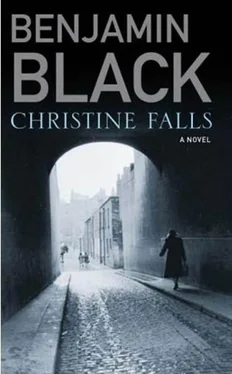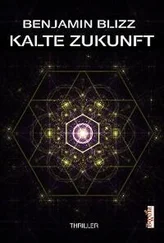“Oh?” he said. “What child is that?”
“The child that Christine Falls was carrying. The one that wasn’t stillborn. Christine was her name, too.”
Mal sighed. For a long moment he was silent, and then said:
“Funny, I don’t remember snow when we were here, all those years ago.” He turned his glance and looked into Quirke’s face in search of something. “Do you, Quirke? Do you remember snow?”
“Yes, there was snow,” Quirke said. “A whole winter of it.”
“So it was.” Mal, facing the window again, was nodding slowly, as if at word of some far-off wonder. He lifted a finger and tapped it on the bridge of his glasses. “I had forgotten that.” The light from the garden was dead white against his face. He cracked his knuckles pensively.
“She was yours, wasn’t she?” Quirke said. “Your child.”
Now Mal dropped his eyes and smiled.
“Oh, Quirke,” he said, as if almost with fondness, “you know nothing, I’ve told you that before.”
Quirke said:
“I know that the child is dead.”
There was another silence. Mal was frowning again, and glancing here and there distractedly, from the garden to the folds of the roped-back drapes to the floor at his feet, as if there were a thing he had lost that might be found anywhere, in any of these places.
“I’m sorry to hear that,” he said absently. Then of a sudden he turned fully toward Quirke and laid a hand on his shoulder. Quirke looked at the hand; when last had either of them touched the other? “All this business,” Mal said, “why can’t you let it go, Quirke?”
“It won’t let me go.”
Mal considered this for a moment, pursing his lips judiciously. He let his hand fall from Quirke’s shoulder.
“It’s not like you, Quirke,” he said, “this stubbornness to see a thing through.”
“No,” Quirke said, “I suppose it’s not.”
And then all at once he saw it, the entire thing, and how wrong he had been all along, wrong about Mal, and so much else. Mal had turned his head and was watching him again, and when Quirke met his eye he saw what Quirke had suddenly seen, and he nodded once, faintly.
QUIRKE WANDERED THROUGH THE HOUSE. IN JOSH CRAWFORD’S library the fire of pine logs was burning as usual and the light from the window gleamed on the upper cheek of the globe of the world. He went to the table where the drinks were and poured himself half a tumblerful of scotch. Behind him Rose Crawford said, “Goodness, Mr. Quirke, you do look grim.” He turned quickly. She was stretched in an armchair under a tall, potted palm. Her tight black dress was rucked at the hips and she had kicked off one of her shoes. She had a cigarette in one hand and an empty martini glass in the other, tilted at an angle. She was, he could see, a little tipsy. “Do you think,” she said, proffering the glass, “you could fix me another one of these painkillers?”
He went to her and took the glass and returned to the table.
“How are you?” he said.
“How am I?” She considered. “Sad. I miss him already.” He brought her the drink and handed it to her. She fished out the olive with her fingers and munched it ruminatively. “He was funny, you know,” she said, “in his awful way. I mean humorous. He made me laugh.” She spat the olive stone delicately into her fist. “Even in these last days, when he was so ill, we were still laughing. Means a lot to a girl, the occasional chuckle.” She squinted up at him. “I guess you wouldn’t have appreciated his jokes, Mr. Quirke.” She put out her fist and he opened his palm and she dropped the olive stone into it. “Thanks.” She frowned. “Sit down, will you? I hate to be loomed over.”
He went and sat on the sofa that was set back from the fireplace. The snow outside was falling fast now, he fancied he could hear the huge, busy whisper of it as it swamped the air and settled on the already blanketed lawn and on the invisible terraces and stone steps and graveled walkways. He thought of the sea out there beyond the garden, the waves a dark, muddy mauve, swallowing the endless fallings of frail flakes. Rose too was looking toward the windows and the slanted, moving whiteness beyond.
“Coincidence,” she said. “I just realized, he died on our wedding anniversary. Trust him.” She laughed. “He probably planned it. He had powers, you know. It’s true, you think I’m making it up-he could read my mind. Maybe he’s reading it now”-she looked at Quirke with a lazy, sly smile-“though I hope not.” She heaved a shivery sigh, weary and regretful. “He was a mean old buzzard, I suppose, but he was my mean old buzzard.” Her cigarette had gone out, and he rose and brought his lighter and held it for her, leaning on his stick. “Look at you,” she said. “They did beat up on you, didn’t they?”
“Yes,” he said, “they did.”
He returned to the sofa; he noticed that his glass was empty.
“But you must be happy, now,” she said, “with Sarah here?” When she spoke the name she put into her voice a huskily mocking tremor. She grinned at him. “Why don’t you tell me about her: her, and Mal, and Delia.”
He made an impatient gesture.
“That’s all old history,” he said.
“Oh, but the old stuff is always the best. Secrets are like wine, Josh used to say-they get a richer flavor, a finer bouquet, with every year that passes. I’m trying to picture the four of you here”-she waggled the stem of her glass to indicate all that she meant by here -“happy and gay. Parties, tennis on the lawn, all that. The two beautiful sisters, the two dashing medical men. How Josh must have hated you.”
“Did he tell you that?” he asked with interest. “That he hated me?”
“I don’t know that we ever got that far in our discussions of you, Mr. Quirke.”
She was making fun of him again. She sipped her drink and watched him with faint merriment over the rim of her glass.
“Will you,” he asked, “go on payrolling this business with the babies that he was operating?”
She lifted her eyebrows and opened wide her eyes.
“Babies?” she said, then turned her head aside and shrugged. “Oh, that. He made me promise I would. It would be his ticket out of Purgatory, he said. Purgatory! Honestly! He really believed all that, you know, Heaven, Hell, redemption, angels dancing on the head of a pin-the whole caboodle. He would get furious when I laughed. But how could I not? Laugh, I mean.” She looked down. “Poor Josh.” She began to cry, making no sound. She caught a tear on a fingertip and held it out for him to inspect. “Look,” she said, “neat Tanqueray, with just the faintest hint of dry vermouth.” She lifted her head and a palm frond brushed her cheek and she swatted it away. “Goddamned things,” she said, “I’m going to have every one of them yanked up and burned.” She let her shoulders droop. She sniffed. “A gentleman,” she said in a parody of a bobby-soxer’s twitter, “would offer his handkerchief.”
He heaved himself up again and limped across to her and handed her the folded square of linen. She blew her nose loudly. He realized that he wanted to touch her, to caress her hair, to run a finger along the clean, cool line of her jaw.
“What will you do?” he said.
She wadded up the handkerchief and gave it back to him with a wryly apologetic grimace.
“Oh, who knows,” she said. “Maybe I’ll sell this dump and move to rotten old Europe. Can’t you see me, in furs, with a lapdog, the most sought-after widow in Monte Carlo? Would you make a play for me, Quirke? Accompany me to the roulette tables, travel with me on my yacht to the isles of Greece?” She laughed softly down her nose. “No. Hardly your style. You’d rather sit in the Dublin rain nursing your unrequited love for”-she let her voice sink tremulously again-“ Saarrah !”
Читать дальше












